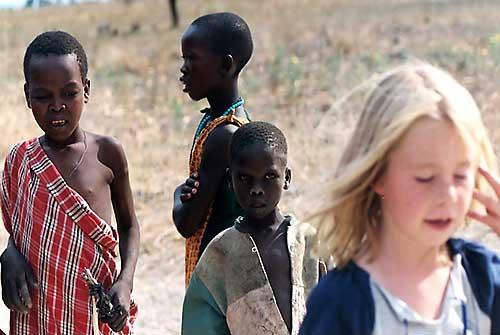
RPCV Jayne Lewis Kulzer and her 7-year-old daughter travel in Kenya and Tanzania
A child's firsthand E. Africa learning adventure
Caption: Kienna Kulzer, right, of Seattle, plays with local children near Tarangire National Park in Tanzania.
In a time when many Americans are nervously avoiding adventurous overseas trips, Jayne Lewis Kulzer and her 7-year-old daughter headed off to East Africa.
For Kulzer, a public-health specialist from Seattle, it was a working trip to an AIDS conference in Kenya. For her daughter, Kienna, it was an eye-opening journey to a tough, impoverished, yet generous-spirited part of the world.
In the Kenyan capital of Nairobi, mother and daughter rode in "matatus," the jampacked and wildly driven minivans that are the transport backbone of Nairobi's teeming neighborhoods.
In the countryside, they drove across vast plains where elephants, cheetahs and rhinos roam free.
In the neighboring country of Tanzania, they visited a school where the differences between the haves and have-nots startled Kienna:
"The kids bring a broom and sweep the school in the morning. They don't have many things, just an old writing book and pencil," Kienna wrote in a journal she kept during the trip. "For math they count bottle caps on a string or rocks."
A country's challenges
Beyond poverty, Kenya has suffered terrorist attacks on Western interests, including the deadly 1998 bombing of the U.S. Embassy in Nairobi and more recent threats. The U.S. State Department has at times warned Americans to avoid nonessential travel to Kenya. But Kulzer, an experienced traveler and former Peace Corps volunteer, was not overly concerned, and their mother-and-daughter fall trip went smoothly.
It wasn't always easy, however. For Kienna, accustomed to the tranquil Seattle neighborhood of Magnolia, the stark poverty and sprawling hustle of some Nairobi neighborhoods was overwhelming.
But in the smaller community of Sinon, in Tanzania, where family friends run a school and a farm, Kienna found the Africa she'd envisaged from books and photos, said her mother:
"She felt like she'd finally arrived in Africa. There were baskets on women's heads, kids in uniform walking to school, mud huts with thatched roofs, cinderblock homes with noisy tin roofs, babies on backs, Maasai (tribal people) in red cloth," said Kulzer. "And goats and chickens everywhere."
Kienna learned some of life's basics, too, down on the farm.
"(Our friend) Frank taught me how to milk cows. It was fun and easy. I squirted milk at my mom," she wrote in her journal. "The bull cow had a play date with a girl cow and he jumped on top of her and then licked her all over."
But Kienna got more far-reaching lessons from the trip, too, said her mother.
"She wondered why there were guards and layers of gates everywhere, why kids had dirty old school notebooks and broken pencils, why many kids couldn't afford to go to school, why there were so many kids and women begging in the streets, why people were hungry," said Kulzer.
"She now has a better understanding of what poverty is, but more importantly she experienced how kind, generous, resourceful and upbeat people were in spite of it."
On the long plane journey back to Seattle, Kienna carefully wrote in her journal:
"I will miss Africa because there are sewing classes, cooking classes and workshops at the school and there are farm animals, bumpy roads and wild animals and people everywhere."
But a little bit of Africa has come to Kienna. New students from Nairobi have just started school in her class. Thanks to her East Africa journey, now she can truly understand where they're coming from.
Kristin Jackson is an editor and reporter with the Seattle Times Travel section. Her Family Matters column runs the third Sunday of each month. Comments are welcome: 206-464-2271 orkjackson@seattletimes.com
